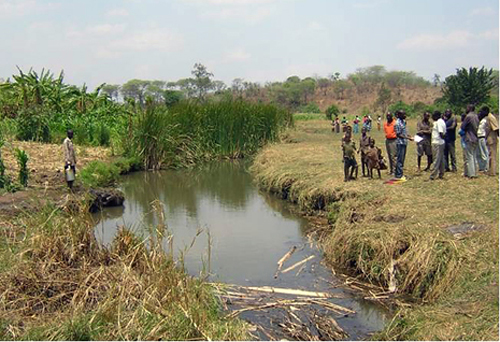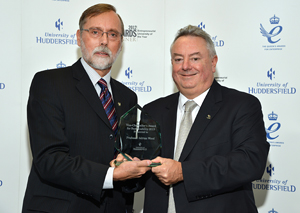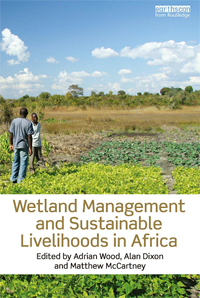Book calls for sustainable management of wetlands by communities
Thu, 30 Jan 2014 14:41:00 GMT
Professor and founder of Wetlands Action calls for “people-focussed” approach in new book, Wetland Management and Sustainable Livelihoods in Africa

A multiple-use wetland in central Malawi.
A UNIVERSITY of Huddersfield expert in sustainable development has called for a major shift in policy over environmentally-vital African wetlands. Although it has been widely believed that they are imperilled by any form of agriculture, it is now being argued by Professor Adrian Wood and his colleagues that small-scale, sustainable farming should be encouraged.
This would aid the survival of wetlands by making them more valuable to communities and so encourage their careful management. This would also secure the livelihoods of local people – helping to counter the effects of climate change and cope with the pressures caused by rising populations.
The views of Professor Wood – who heads the recently-launched Centre for Sustainable and Resilient Communities at the University of Huddersfield – are mirrored in recent material from the Global Convention on Wetlands. Known as the Ramsar Convention – after the Iranian city in which it was drawn up in 1971 – the Ramsar Secretariat organises an annual World Wetlands Day. Taking place on 2 February, its 2014 theme is Wetlands and Agriculture.
View a webinar with Adrian Wood and The Scientific and Technical Review Panel (STRP) by clicking on the link provided.
Wetland Management and Sustainable Livelihoods in Africa

Professor Adrian Wood [left] is pictured receiving the 2013 Vice-Chancellor's Award for Sustainability from Professor Bob Cryan.
Adrian Wood is Professor of Sustainability at the University of Huddersfield and has more than 30 years’ experience of action-based research in Africa, managing wetland research projects in Ethiopia, Malawi and Zambia. He is a powerful advocate of the sustainable management of wetlands by communities, enabling them to earn their livelihoods from the environment, and thereby enhancing the value of these natural resources.
He is a co-founder of the organisation Wetland Action and co-editor of a new book that is being used in preparation for World Wetlands Day with copies distributed in several countries, including Malawi and South Africa.
Entitled Wetland Management and Sustainable Livelihoods in Africa, the book argues for a “people-focussed” approach.
Professor Wood explains that traditional approaches towards wetlands have either been total transformation – large-scale rice or sugar estates leading to the loss of wetlands – or rigorous conservation, preventing most uses, including small-scale farming by communities.
In this video Professor Wood talks about the need for sustainable farming in the African wetlands.
Now, following the arguments made by Professor Wood and his colleagues, the Ramsar Convention has begun to explore how to develop a modus-operandi with small-scale agricultural users. It is a theme that also ties in with the fact that the UN has declared 2014 to be the International Year of Family Farming.
According to an official statement from Ramsar: “Wetlands have often been seen as a barrier to agriculture, and they continue to be drained and reclaimed to make farming land available. But the essential role of wetlands in support of agriculture is becoming clearer and clearer, and there are successful agricultural practices which support healthy wetlands.”
Wetland farming to adapt to climate change
This is the first time that Ramsar has adopted this theme for its annual World Wetlands Day and it is using various means – including the distribution of books and leaflets, plus online blogs – to make the case.
“The Convention is addressing the challenge of how to work with agricultural communities, seeing the multiple use of wetlands as the way to maintain a balance of ecosystem services and thereby help maintain these areas, rather than over develop agriculture and undermine other key services – such as flood control or carbon storage,” says Professor Wood.
He adds that sustainable, small-scale agriculture in wetlands is “a delicate balancing act which some communities have managed for decades or centuries”. Wetland farming is now increasingly a means by which communities in Africa can adapt to climate change and mitigate its impacts.
Wetland Action
The presence of Professor Wood means that since 1996 the University of Huddersfield has been a key centre for the exploration of the role of wetland agriculture in sustaining often fragile areas. It was after a four-year project in the headwaters of a tributary of the Nile in Ethiopia that the organisation Wetland Action was established.
 Since then the University of Huddersfield and Wetland Action have formed partnerships with local and international non-governmental organisations and with the International Water Management Institute on many research project in Africa. After more than ten years of this work, the environmental publishing imprint Earthscan commissioned the new book, Wetland Management and Sustainable Livelihoods in Africa (pictured), with its call for a major shift in attitudes to wetlands, focusing much more on people and multiple use as the way to maintain these areas.
Since then the University of Huddersfield and Wetland Action have formed partnerships with local and international non-governmental organisations and with the International Water Management Institute on many research project in Africa. After more than ten years of this work, the environmental publishing imprint Earthscan commissioned the new book, Wetland Management and Sustainable Livelihoods in Africa (pictured), with its call for a major shift in attitudes to wetlands, focusing much more on people and multiple use as the way to maintain these areas.
The book has contributions from 17 experts in the field, including Professor Wood, who was co-editor with Dr Alan Dixon and Dr Matthew McCartney.







